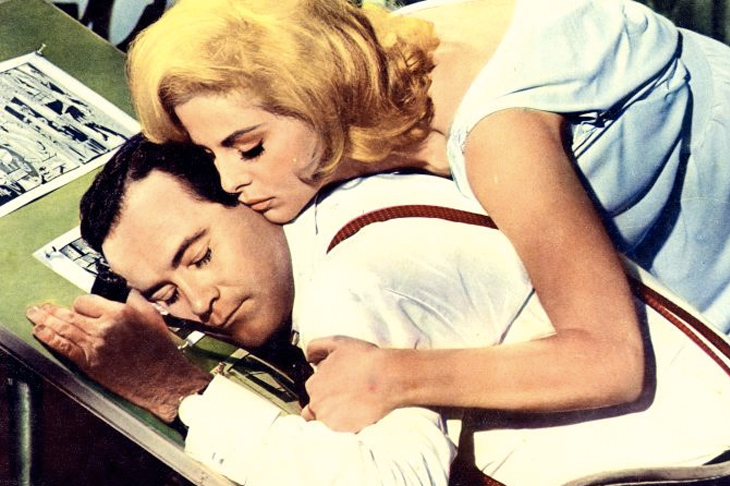The events of the Brett Kavanaugh hearings and the relish President Donald J. Trump displayed in his consequent pushback at the #MeToo movement elicit a Proustian response among those who’ve seen Jack Lemmon’s 1965 comedy How to Murder Your Wife.
If Mr Trump was in any way a cinephile, it might indeed figure as one of his all-time favourite films. If not, the movie still possesses a particular relevance in today’s highly charged political environment.
How so? Without recounting the plot in detail, the hook centres around Lemmon’s wealthy New York bachelor, cartoonist Stanley Ford. After a drunken stag party at his all male club, a plastered Ford finds himself hitched to a gorgeous Italian woman (Virna Lisi) hired to spring from the cake for the delectation of the inebriated revellers.
Tellingly, no name is given to Lisi’s character and she speaks little English.
As his new wife and her mother move in, Ford’s faithful valet Firbank (Terry-Thomas) packs his bags and resigns. Lemmon’s character finds himself increasingly emasculated.
Fantasising in his daily cartoon strip about how to murder his new bride, Ford dopes her with a mickey in a dry run to test the theory. Lisi then promptly disappears.
When brought to trial for murder, Ford details the many ways wives ‘oppress’ their husbands and admits to the crime.
During the trial Ford proclaims:
‘Too long has the American man allowed himself to be bullied, coddled, and mothered, and tyrannised, and in general meant to feel like a feeble-minded idiot by the female of the species. Do you realise the power that you have in your hand here today? If one man – just one man – can stick his wife in the goop from the gloppitta-gloppitta machine, and get away with it! Whoa-ho-ho, boy, we’ve got it made. We have got it made. All of us.’
He is then promptly let off on grounds of ‘justifiable homicide’ by the (wait for it) all-male jury.
Ford is supported on the shoulders of the men and led around in a victory parade, while the wives in the courtroom are suitably cowed — terrified of their other halves’ apparent newly minted license to kill. Which, it must be admitted, probably sounds like catnip to the likes of Trump, Giuliani and co.
Of course, Jack Lemmon possesses far too much charm to be a Trump avatar and the post-trial scene — when it’s revealed that Lisi left Ford after seeing a draft of the offending cartoon and wasn’t actually murdered — would probably irk POTUS’s odd sense of justice. More so the ending, where a contrite Lemmon reconciles with his wife and all is well, and a defeated Terry-Thomas ending up with her mother.
Still, up until these final scenes, How To Murder Your Wife seems like an ideal popcorn/between-tweet experience for Trump, appearing as a fond look back to a presumed Golden Age.
What else may appeal to a Trump movie club?
Leaving aside pornography, there are a fair few candidates that would provide the affirmative rush and self-identification of How To Murder Your Wife without the sickliness incurred by the sentimentality of the ending. But that would be a pass on Elmer Gantry (1961) and the following year’s The Music Man, as well as Annie (1982) and naturally enough The Manchurian Candidate (1962) which would be a definite no-no for a Mar-a-Largo Home Cinema two-scoops blowout.
Trading Places (1982) would no doubt be viewed as a tragic story, with the Duke Brothers as heroic figures, brought low by a disgruntled former employee and (the horror) a black man.
And Redford was too much of a wimp in The Great Gatsby (1974) and Indecent Proposal (1993).
Citizen Kane (1941) would hold little resonance to the easily bored Trump, while Nic Roeg’s Eureka (1983) might disturb him due to the grisly fate of Gene Hackman’s murdered multi-millionaire Harry Oakes. No doubt #45 would be comforted by the fact that Oakes repeated aphorism that he ‘never made a nickel from another man’s sweat’ wouldn’t apply to him.
Which probably leaves one sure bet for a trouble-free evening’s viewing for Mr Trump, Dean Martin’s Matt Helm series (1966-68), truly the chef-d’œuvre of misogynistic, barely-plotted sub-Bond spy knock-offs.
Making James Coburn’s Derek Flint positively cerebral in comparison, Helm appears driven entirely by his desires to drink, hump and kill, in varying orders according to his mood.
Trump is famously a non-imbiber, so Martin’s snookered antics may be not be completely au fait with him, but surely his Helm’s aggressive attitude, ogling, pawing, sexism and all-round obnoxiousness would tickle his fancy.
As Helm sleep walks his way through every explosive situation with nary a scratch, there’s an added similarity to the famously Teflon Trump. He gets to be the saviour of the USA. And occasionally the rest of the world, too. But who cares about them?

























